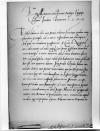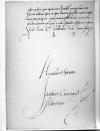Letter #1658
Diego GRACIÁN de Alderete to Ioannes DANTISCUSValladolid, 1537-07-06
| received [1537]-10-07 Manuscript sources:
Auxiliary sources:
Prints:
| ||||||||
Text & apparatus & commentary Plain text Text & commentary Text & apparatus
Reverendissimo atque magnifico Domino, domino
Reverendissimo atque Illustrissimo Domino, domino Ioanni Dantisco episcopo Culmensi Iacobus Gratianus Alderetus salutem plurimam dicit.
Exspectabam in dies aut potius in horas litteras tuas, quibus meis pluribus exemplis ad te missis responderes, vir clarissime. Sed cum eas tardiores prospicerem et
Vale Praesul Reverendissime.
Eiusdem Reverendissimae Dominationis Tuae humillimus servus


